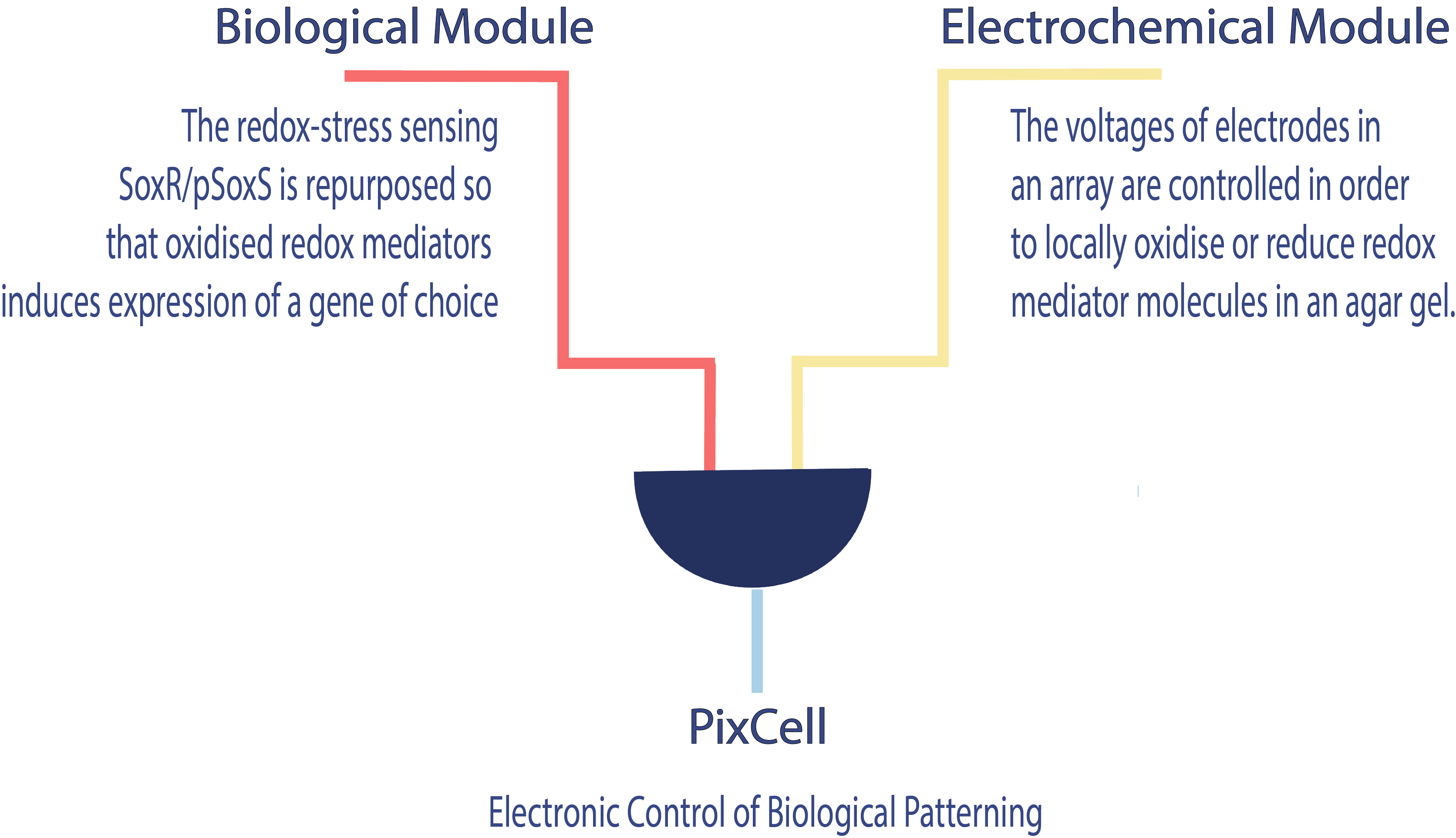| Line 64: | Line 64: | ||
</br> | </br> | ||
<div class="row"> | <div class="row"> | ||
| − | + | <div class="col-xs-6 col-sm-4" id="display-pic"> | |
| − | + | ||
| + | <img src="https://static.igem.org/mediawiki/2018/7/79/T--Imperial_College--FIGX3T.gif" alt="" width="50%"; > | ||
| + | </div> | ||
| + | <div class="col-xs-12 col-sm-4"> | ||
| + | <p>Electrogenetics is a synthetic biology discipline developing electronic methods to control and measure gene expression. For PixCell we developed the first aerobic electrogenetic control system.</p> | ||
| + | </div> | ||
| + | |||
| + | |||
| + | </div> | ||
| + | |||
| + | <div class="row"> | ||
| + | <div class="col-xs-6 col-sm-4" id="display-pic"> | ||
| + | |||
| + | <img src="https://static.igem.org/mediawiki/2018/9/94/T--Imperial_College--FIGX4Tv2.gif" alt="" width="50%"; > | ||
| + | </div> | ||
| + | <div class="col-xs-12 col-sm-4"> | ||
| + | <p>Using this system we demonstrated precise, programmable biological patterning using an affordable custom-built electrode array. </p> | ||
| + | </div> | ||
| + | |||
| + | |||
</div> | </div> | ||
| + | |||
<div class="row"> | <div class="row"> | ||
| − | + | <div class="col-xs-6 col-sm-4" id="display-pic"> | |
| − | + | ||
| + | img src="https://static.igem.org/mediawiki/2018/7/71/T--Imperial_College--FIGX5T.gif" alt="" width="50%"; > | ||
| + | </div> | ||
| + | <div class="col-xs-12 col-sm-4"> | ||
| + | <p>We further improved our system by building a library of electrogenetic parts compatible with a variety of assembly standards. This is the first electrogenetic toolkit and has been characterised for “plug-and-play” manipulation of the transcriptional response to electricity. </p> | ||
| + | </div> | ||
| + | |||
| + | |||
</div> | </div> | ||
| + | |||
<div class="row"> | <div class="row"> | ||
| − | + | <div class="col-xs-6 col-sm-4" id="display-pic"> | |
| − | + | ||
| − | + | <img src="https://static.igem.org/mediawiki/2018/1/1c/T--Imperial_College--FIGX6T.gif" alt="" width="50%"; > | |
| − | + | </div> | |
| − | + | <div class="col-xs-12 col-sm-4"> | |
| − | + | <p>Robust models of the system were developed so that electrogenetic circuits can be tested in silico before they are in vivo. </p> | |
| + | </div> | ||
| + | |||
| + | |||
</div> | </div> | ||
<div class="row"> | <div class="row"> | ||
| − | + | <div class="col-xs-6 col-sm-4" id="display-pic"> | |
| − | + | ||
| − | + | <img src="https://static.igem.org/mediawiki/2018/2/2e/T--Imperial_College--FIGX7Tbiocon.gif" alt="" width="50%"; > | |
| + | </div> | ||
| + | <div class="col-xs-12 col-sm-4"> | ||
| + | <p>Using this library we developed devices with important applications in the fields of biocontainment and manufacturing.</p> | ||
| + | </div> | ||
| + | |||
| + | |||
</div> | </div> | ||
| − | + | ||
| + | |||
<div class="integration"> | <div class="integration"> | ||
Revision as of 21:06, 17 October 2018
Project Description

PixCell

Electrogenetics is a synthetic biology discipline developing electronic methods to control and measure gene expression. For PixCell we developed the first aerobic electrogenetic control system.

Using this system we demonstrated precise, programmable biological patterning using an affordable custom-built electrode array.
We further improved our system by building a library of electrogenetic parts compatible with a variety of assembly standards. This is the first electrogenetic toolkit and has been characterised for “plug-and-play” manipulation of the transcriptional response to electricity.

Robust models of the system were developed so that electrogenetic circuits can be tested in silico before they are in vivo.

Using this library we developed devices with important applications in the fields of biocontainment and manufacturing.
Mechanism

Electronic control
Patterning













